Vacuum-sealed meat can last up to 2-3 years in the freezer. The sealing process prevents freezer burn and preserves quality.
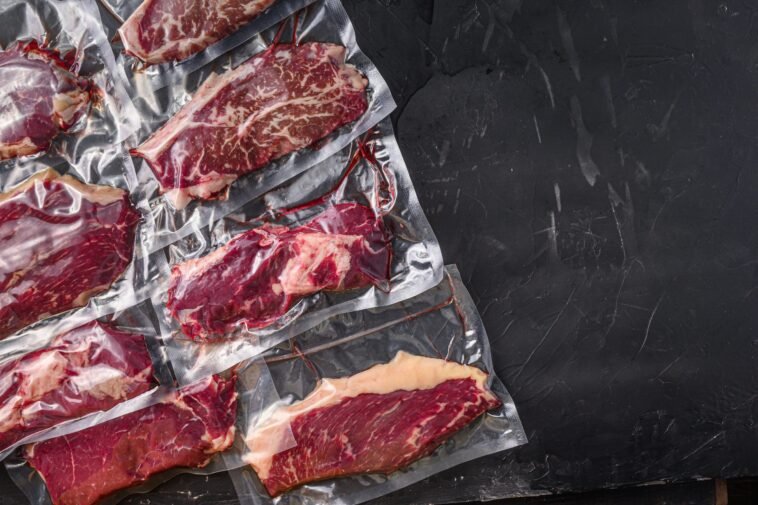
Vacuum sealing is a game-changer for preserving meat in the freezer. This method removes air, significantly extending the shelf life compared to traditional storage methods. Freezer burn, a common issue with regular storage, is almost entirely eliminated. This ensures the meat maintains its original taste, texture, and nutritional value for much longer periods.
For anyone looking to buy meat in bulk or preserve seasonal game, vacuum sealing is a reliable and efficient solution. It’s a simple yet effective way to maximize the freshness and longevity of your meat products.
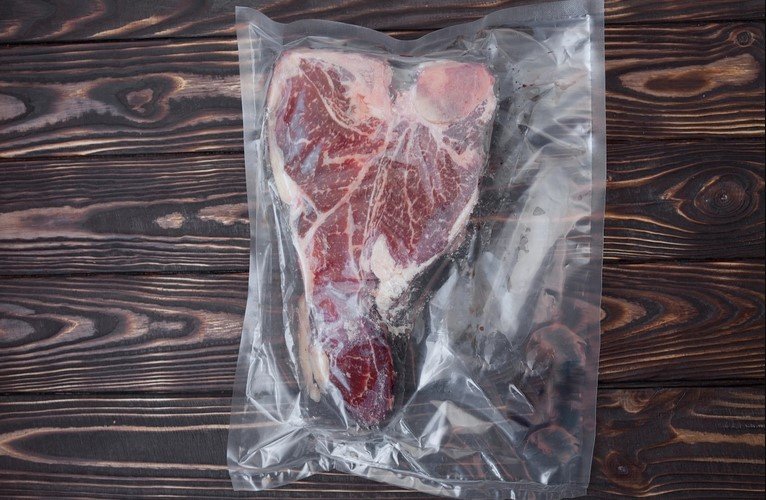
Introduction To Vacuum Sealing
Vacuum sealing is a popular method for preserving food. It is especially useful for meat. This method removes air from the packaging. The absence of air helps prevent spoilage and freezer burn. Vacuum sealing also extends the shelf life of food.
What Is Vacuum Sealing?
Vacuum sealing involves placing food in a plastic bag. A machine removes the air from the bag. The bag is then sealed tightly. This creates an air-tight environment. The lack of air slows down bacterial growth. The food remains fresh for a longer time.
Benefits Of Vacuum Sealing
Vacuum sealing offers many benefits:
- Longer Shelf Life: Meat can last longer in the freezer.
- Prevents Freezer Burn: No air means no freezer burn.
- Better Taste: Meat retains its flavor and texture.
- Space-Saving: Flat packages take up less room.
Here is a table showing shelf life:
| Type of Meat | Vacuum Sealed | Not Vacuum Sealed |
|---|---|---|
| Beef | 2-3 years | 6-12 months |
| Poultry | 2-3 years | 6-9 months |
| Pork | 2-3 years | 4-8 months |
Using vacuum sealing is a smart choice. It saves money and reduces waste. It helps keep your food fresh and tasty.
Factors Affecting Meat Shelf Life
Understanding the factors affecting meat shelf life is crucial. These factors ensure your vacuum-sealed meat stays fresh in the freezer. Explore how different elements play a role in preserving your meat’s quality.
Type Of Meat
The type of meat significantly affects its shelf life in the freezer. Red meats like beef and lamb generally last longer compared to poultry or fish. Here’s a simple table to illustrate the differences:
| Type of Meat | Average Shelf Life (Months) |
|---|---|
| Beef | 12-24 |
| Lamb | 12-24 |
| Pork | 6-12 |
| Chicken | 6-9 |
| Fish | 3-6 |
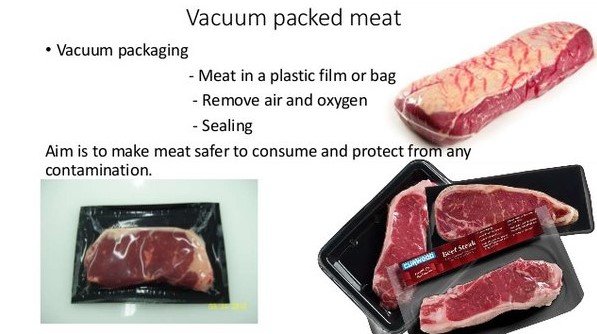
Storage Conditions
Proper storage conditions are essential for extending meat shelf life. Keep the freezer temperature at or below 0°F (-18°C). Consistent temperature helps prevent freezer burn and maintains meat quality.
Use these tips for better storage:
- Check Seals: Ensure vacuum seals are intact to prevent air exposure.
- Label Packages: Always label with the date of freezing for easy tracking.
- Avoid Overloading: Do not overload the freezer to allow proper air circulation.
Following these practices ensures your vacuum-sealed meat lasts longer and stays fresh.
Freezer Storage Guidelines
Knowing how to store vacuum-sealed meat properly is essential. It ensures the meat stays fresh and safe to eat for longer periods. Let’s dive into the best practices for freezing vacuum-sealed meat.
Optimal Freezer Temperature
Maintaining the right temperature is crucial. Set your freezer to 0°F (-18°C). This temperature keeps the meat safe from bacteria. Use a thermometer to monitor the freezer’s temperature. Consistency is key to preserving meat quality.
Proper Sealing Techniques
Sealing meat correctly prevents freezer burn. Here are some effective techniques:
- Use high-quality vacuum sealers for the best results.
- Ensure the meat is dry before sealing. Moisture can cause ice crystals.
- Place the meat in vacuum-sealed bags. Remove as much air as possible.
- Double-seal the edges of the bag to ensure no air gets in.
Follow these guidelines to maximize the shelf life of your vacuum-sealed meat in the freezer. Remember, proper storage maintains flavor and texture.
Expected Shelf Life Of Vacuum Sealed Meat
Vacuum-sealing meat can significantly extend its shelf life. When meat is vacuum sealed, it is protected from air and moisture. This preservation method can keep your meat fresh for longer periods.
Beef And Pork
Beef and pork have a longer shelf life when vacuum sealed. Properly vacuum-sealed beef and pork can last in the freezer for up to 2-3 years. This extended shelf life is due to the reduced exposure to air and moisture.
| Type of Meat | Freezer Shelf Life |
|---|---|
| Beef | 2-3 years |
| Pork | 2-3 years |
Poultry And Fish
Poultry and fish also benefit from vacuum sealing. Vacuum-sealed poultry can last up to 1-2 years in the freezer. When vacuum sealed, fish can remain fresh for up to 2 years. This makes it easier to store and use later.
- Poultry: 1-2 years
- Fish: Up to 2 years
Knowing the expected shelf life of vacuum-sealed meat helps you plan better. It ensures your meat stays fresh and safe for consumption.
Signs Of Spoiled Meat
Recognizing the signs of spoiled meat is essential for food safety. Even vacuum-sealed meat can spoil if stored improperly. Knowing these signs helps avoid health risks.
Changes In Color
One clear indicator of spoiled meat is color changes. Fresh meat has a bright red or pink color. It may be spoiled if it turns brown, gray, or green.
| Type of Meat | Fresh Color | Spoiled Color |
|---|---|---|
| Beef | Bright red | Brown or gray |
| Pork | Pinkish-red | Gray or green |
| Chicken | Pale pink | Gray or green |
Off Odors
Spoiled meat often has a strong, unpleasant odor. Fresh meat has a mild, natural smell. It is likely spoiled if the meat smells sour, rancid, or fishy.
- A rancid smell indicates bacterial growth.
- The sour smell suggests the meat is off.
- A fishy smell means the meat is no longer fresh.
Always trust your senses. If the meat looks or smells bad, discard it. These signs are crucial for ensuring the meat is safe to eat.
Tips For Extending Shelf Life
Ensuring your vacuum-sealed meat lasts longer in the freezer is essential. Proper techniques and tools can make a significant difference. Here are some expert tips to help you extend the shelf life of your vacuum-sealed meat.
Regular Freezer Maintenance
Keeping your freezer in good condition is crucial. A well-maintained freezer ensures the meat stays fresh longer.
- Set the freezer temperature to 0°F (-18°C) or lower. Cold temperatures slow down bacterial growth.
- Defrost your freezer regularly. Ice buildup can affect temperature stability.
- Keep the freezer clean. Remove old or expired items to prevent odors.
- Organize the freezer. Label and date your vacuum-sealed meat for easy rotation.
Using Quality Vacuum Sealers
A good vacuum sealer is an investment. It ensures the meat stays fresh and free from freezer burn.
- Choose a vacuum sealer with strong suction power. It removes more air, reducing oxidation.
- Use high-quality vacuum sealer bags. These bags are thicker and more durable.
- Seal meat properly. Ensure no air pockets are left in the bag.
- Double-seal for extra protection. This helps prevent accidental openings.
By following these tips, you can maximize the shelf life of your vacuum-sealed meat.
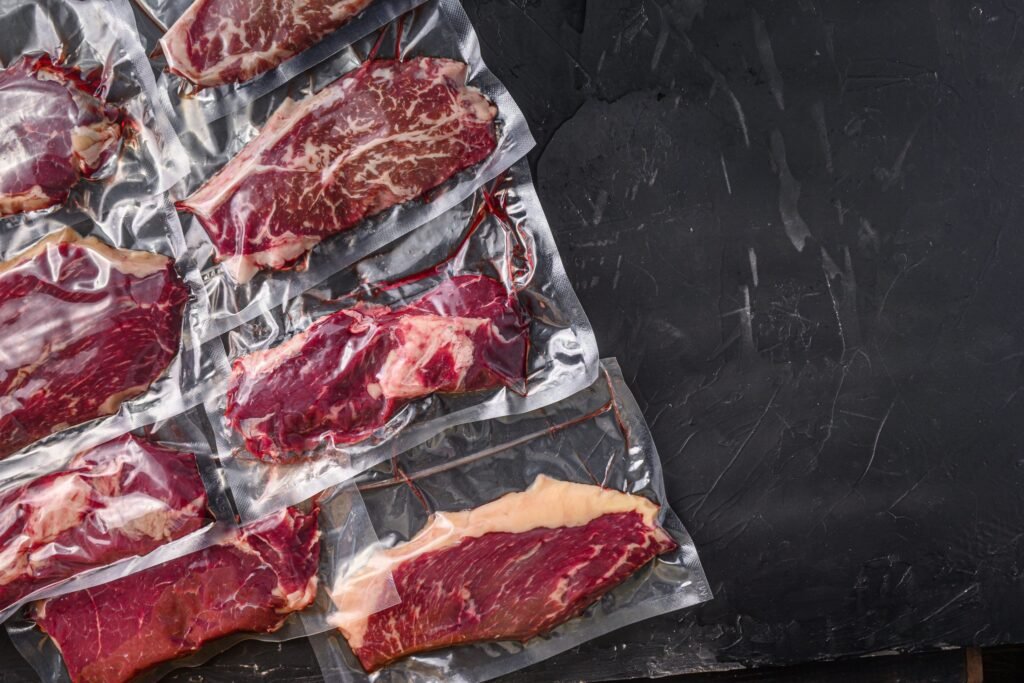
Expert Opinions
Understanding how long vacuum-sealed meat lasts in the freezer is crucial. Expert opinions provide valuable insights to ensure your meat stays fresh and safe. Here, we explore insights from food scientists and advice from butchers.
Insights From Food Scientists
Food scientists study food safety and preservation methods. They emphasize the importance of vacuum sealing to extend meat’s shelf life. Vacuum sealing removes air, reducing the risk of freezer burn. This process slows down bacterial growth, keeping the meat fresh longer.
According to food scientists, vacuum-sealed meat can last up to 2-3 years in the freezer. The exact duration depends on the type of meat and storage conditions. For example:
| Type of Meat | Duration |
|---|---|
| Beef | 2-3 years |
| Pork | 2-3 years |
| Poultry | 1-2 years |
| Fish | 1-2 years |
Advice From Butchers
Butchers have hands-on experience with meat storage. They recommend vacuum sealing for long-term storage. Butchers suggest labeling vacuum-sealed packages with the date of freezing. This practice helps track the freshness of the meat.
Butchers also advise freezing meat at 0°F (-18°C) or lower. This temperature prevents bacterial growth and preserves the meat’s quality. They stress the importance of proper sealing techniques. Any air left in the package can reduce the meat’s shelf life.
To ensure optimal freshness, follow these steps:
- Use a high-quality vacuum sealer.
- Ensure the package is airtight.
- Label the package with the date.
- Store in a deep freezer at 0°F (-18°C) or lower.
Following expert advice ensures your vacuum-sealed meat stays fresh in the freezer. Both food scientists and butchers agree on the benefits of proper vacuum sealing.
Common Myths And Misconceptions
Vacuum-sealed meat in the freezer is a great way to store food. But, many believe myths and misconceptions about its longevity. This section will uncover the truth behind common myths.
Myth Of Indefinite Shelf Life
Many think vacuum-sealed meat lasts forever. This is not true. While vacuum sealing extends the shelf life, it does not make meat immortal. The meat will still degrade over time.
Frozen, vacuum-sealed meat usually lasts up to 2-3 years. This depends on the type of meat and how well it was sealed. For best quality, consume within this period.
Misunderstandings About Freezer Burn
Another common myth is that vacuum-sealed meat can’t get freezer burn. Freezer burn occurs when air reaches the food. Vacuum sealing removes most air, reducing the risk but not eliminating it.
To avoid freezer burn, ensure the meat is properly sealed. Check for any gaps or tears in the packaging. Proper sealing keeps meat fresh and tasty for longer.
Frequently Asked Questions
Does Vacuum-sealed Meat Go Bad In The Freezer?
Yes, vacuum-sealed meat can go bad in the freezer. It lasts longer but still has a shelf life. Generally, it stays good for up to 2-3 years. Always check for any signs of spoilage before consuming.
How Can You Tell If Vacuum-sealed Meat Is Still Good?
Check the color, smell, and texture. Meat should be bright, odorless, and firm. Discard if slimy or discolored.
How Long Does Vacuum-sealed Raw Meat Last?
Check the color, smell, and texture. Meat should be bright, odorless, and firm. Discard if slimy or discolored.
Can Vacuum-sealed Cured Meat Go Bad?
Yes, vacuum-sealed cured meat can go bad. Proper storage is crucial. Always check expiration dates and store them in a cool place.
Yes, vacuum-sealed cured meat can go bad. Proper storage is crucial. Always check expiration dates and store them in a cool place.
Vacuum-sealed meat can last up to two years in the freezer. Proper storage ensures optimal freshness and taste. Always label and date your packages. This helps you keep track of storage times. By following these tips, you can enjoy delicious, safe meat meals for longer.

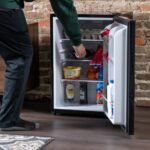
GIPHY App Key not set. Please check settings